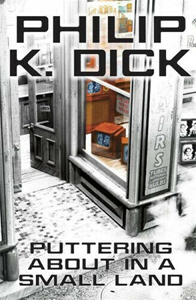One of the paradoxes of Philip K. Dick’s career is that he wrote his most robust and mature observations about human behavior at the sputtering start of his career, with none of those nine books from 1950-60 being immediately published. Then he tried his hand at pulp SF and got good at it. But writing about the human condition in 1950s California under American societal morals of the time was arguably his natural calling.
2 families putter along
But these books do have a handicap compared to his SF books. The point of “Puttering About in a Small Land” (written in 1957, published in 1985) is right there in the title: It’s about two families puttering along. The Lindahls and the Bonners live in Los Angeles and send their kids to a school in Ojai. Roger Lindahl runs a TV and radio sales and repair shop, and Chic Bonner would like to partner with him. That doesn’t have the same hook as “What if the Axis powers won the war?” or “What if androids walked among us?”
Because of the publishing delay, PKD’s present-day novels became his peeks into the past, and instead of SF prophecy, we get real-world detailed observations. At 317 pages, “Puttering” is on the long side among PKD’s works, and its mellow subject matter means you’ll likely spend more time per page than with an SF novel. It’s worth it, though.

“Puttering About in a Small Land” (1985)
Composition year: 1957
Author: Philip K. Dick
Genre: Character drama
Setting: 1957, Los Angeles and Ojai
A lot of PKD sad sacks consider killing themselves, but Roger doesn’t want to die, he just exists in an emotionally trapped life – married to Virginia, but in love with Liz Bonner. PKD shows wonderful restraint in telling this story.
By the time Roger and Liz hook up at a motel on the drive back from dropping their kids off for the week in Ojai, we know Roger is obsessing over Liz. But the author never comes right out and states that; he just shows us how Roger’s emotions alter when he’s around Liz, and we realize that we had gotten the message all along in subtle fashion.
By the final page, the novel’s more specific point about Roger coalesces; he’s certainly the main character. However, we also get the POVs of Liz, Virginia and Chic at times. One particularly striking passage gives us Liz’s thoughts while being intimate with Roger. Those who say PKD can’t write sex scenes perhaps haven’t read – or forgot about – this book; it’s more a case where he usually doesn’t care to write them as well as he does here.
Liz’s perspective
Up to this point, Liz had been seen as dumb by Virginia, school principal Mrs. Alt, and even Roger himself – despite his growing crush on her. By giving us Liz’s inner thoughts, we see how one person’s idea of dumb is another’s slightly different perspective on the world. Liz’s nature does not change during the story – so, yes, she is simple in that sense — but toward the end, Roger admires her for the very traits that irritated him earlier.
PKD tries a couple of interesting style tricks, both of which succeed. In the early chapters, we get flashbacks to the time when Roger and Virginia first meet in Washington, D.C. We also get even earlier, but also hazier, flashbacks to Roger and his brother playing on their farm in Arkansas as kids. Those past events inform the present in a style recently popularized by TV’s “This Is Us.”
The author is also perhaps thinking in terms of a cinematic grace note in the final 35 pages or so. The plot has been resolved, and we’re shown the future consequences for everyone. In a way, it’s hard to read because we’re back in “What’s the point?” mode.
At the book’s start, we know the details – such as the stress of the drive through the mountains to the school – are puzzle pieces toward what makes the Lindahls and Bonners tick. (Plus, this is just a great piece of time-capsule and place-capsule writing.)
At the end, we feel like we’ve finished our homework, so why are we getting more? Plus, it’s a sad denouement. As noted, PKD clinches it on the final page, though.
Morality vs. happiness
“Puttering About in a Small Land” is ultimately about the way morals and logistics can keep someone from their truest form of happiness. PKD has something to say about the emotionally valid reasons why fathers/husbands flee, without ever viewing Roger as a hero.
Indeed, Roger is almost always portrayed as pathetic. He might be sympathetic to a reader only because we get his internal POV, laden with universal frustrations, from the mountain drive to the narrow margin for sales success. No one is a hero or villain here, although they all take turns being protagonists and antagonists in given scenes.
As is often the case in PKD’s SF works, too — where his character writing is overshadowed by his ideas — the end result is that we gain a profound appreciation for the longings, frustrations and pain of being a human living among humanity.


